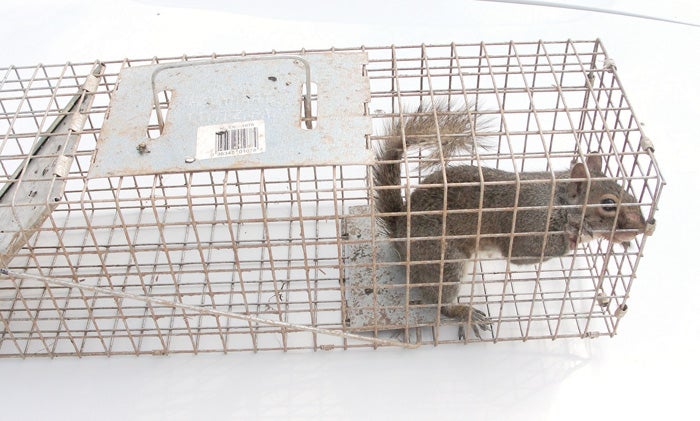So cute, so smart, and such a pain in the yard
Published 12:01 am Friday, November 10, 2017

- Submitted photo It's not easy getting rid of squireels. The best method is to trap them and remove them from your property to somewhere else.
Pesky squirrels have been a constant thorn in the side of many homeowners, especially those who live in the city.
While many people enjoy watching these active creatures, others are rightfully upset at the damage perpetrated by these small, furry animals. Bird feeding stations and raised planters seem to be their favorite sites to destroy. Those with oak and hickory trees can expect regular visits from our state mammal, the gray squirrel.
June is the breeding season for gray squirrels in our area, so they are active during this time. Young squirrels may breed twice a year with a gestation period of 42-45 days, with usually three young in the litter.
Shrinking habitats and lack of natural enemies force squirrels to areas of abundant food and water. Typically, only about half the squirrels in a population die each year. Squirrels can live up to 12 years but rarely in the wild do squirrels live to be 4 years of age.
Both home and commercial remedies designed to repel squirrels away have mixed results. Taste repellents can be applied to plants, flowers, trees and shrubs in an effort to make the squirrel search elsewhere for food.
Repellents containing capsaicin (hot pepper mix) is commonly used with mixed results. Some report hot pepper works well, while others report that the squirrels regard it as an interesting condiment.
Homeowners automatically think of using moth balls to ward off marauding squirrels. Unfortunately, this method of control has little or no success. Many bird feeders now feature squirrel proof designs to deter squirrels. Like all attempts to foil the bandits, these, too, have mixed reviews.
State wildlife biologists suggest obtaining a deprivation permit if squirrels cause property damage. Baited live traps seem to be the best method of control for those who live in urban areas. Traps can effectively be baited with slices of orange, walnuts or pecans removed from the shell or with peanut butter. Live squirrel traps are readily available from hardware and farm supply stores.
Captured squirrels should be relocated at least 5 miles away to an approved site (from landowner, etc.) to prevent return. Hunting season for squirrels began this year in mid-October and closes Feb. 28. Landowners can shoot squirrels on their property, but those hunting on others’ property must have a valid state hunting license. Contact the state wildlife biologist at 919-707-0050 to obtain the permit or for more detailed questions on state laws concerning squirrel removal.
Darrell Blackwelder is the retired Cooperative Extension director with the North Carolina Cooperative Extension Service in Rowan County.




